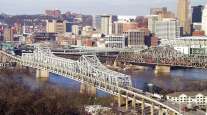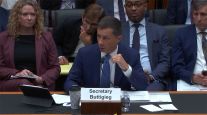Associated Press
Senate GOP Moves Forward on $1T Infrastructure Bill
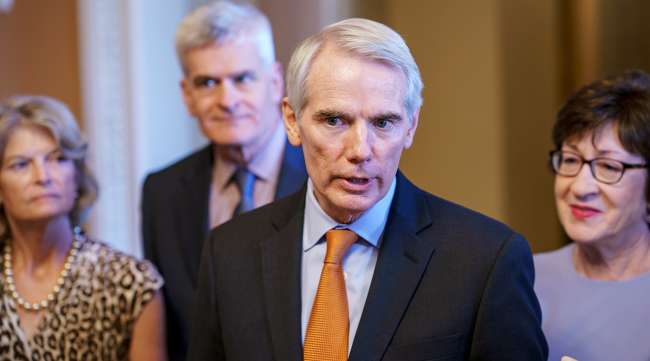
[Stay on top of transportation news: Get TTNews in your inbox.]
WASHINGTON — President Joe Biden and a bipartisan group of senators reached agreement July 28 on a $1 trillion infrastructure package, with the Senate ready to begin consideration of a key part of the administration's agenda. An evening test vote was possible.
Biden welcomed the accord as one that would show America can “do big things" — with the most significant long-term investments in nearly a century, on par with building the transcontinental railroad or the Interstate highway system.
“This deal signals to the world that our democracy can function,” Biden said in a statement. “We will once again transform America and propel us into the future.”
Lead GOP negotiator Sen. Rob Portman of Ohio made the announcement at the Capitol, flanked by four other Republican senators who have been in talks with Democrats and the White House on the bipartisan package.
“We now have an agreement on the major issues,” Portman said. “We are prepared to move forward.”
Sen. Krysten Sinema of Arizona, a lead Democratic negotiator, said she spoke with President Joe Biden and he was “very excited” to have an agreement.
The bipartisan package includes about $600 billion in new spending on highways, bridges, transit, broadband, water systems and other public works projects.
For days, senators and the White House have worked to salvage the bipartisan deal, a key part of Biden’s agenda.
The outcome will set the stage for the next debate over Biden’s much more ambitious $3.5 trillion spending package, a strictly partisan pursuit of far-reaching programs and services including child care, tax breaks and health care that touch almost every corner of American life, and that Republicans strongly oppose.
Senate Majority Leader Chuck Schumer opened the Senate announcing a possible test vote on the bipartisan package in the evening. It will require 60 votes in the evenly split 50-50 Senate to proceed to consideration, meaning support from both parties. That would launch a potentially long process to consider the bill and any possible amendments.
Republican senators met in the morning with Senate GOP leader Mitch McConnell, who appears to have given his nod to proceed. Portman said McConnell “all along has been encouraging our efforts.”
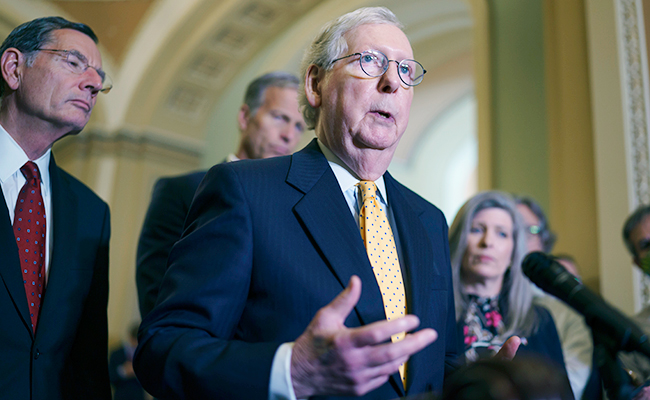
Senate Minority Leader Mitch McConnell (R-Ky.) meets with reporters July 27. McConnell said he would vote to proceed, though whether he will support the final bill remains uncertain. (J. Scott Applewhite/Associated Press)
Democrats, who have slim control of the House and Senate, face a timeline to act on what would be some of the most substantial pieces of legislation in years.
Filling in the details has become a monthlong exercise ever since the senators struck an agreement with Biden more than a month ago over the broad framework. There remains work to do as they draft the legislative text.
Sen. Mitt Romney (R-Utah), who has been central to talks, said, “That doesn’t mean every ‘t’ is crossed, every ‘i’ dotted, but on the major issues we are there.”
The new spending in the package dropped from about $600 billion to $550 billion, senators said, as money was eliminated for a public-private infrastructure bank and was reduced in other categories, including transit.
The package still includes $110 billion for highways, $65 billion for broadband and $73 billion to modernize the nation's electric grid, according a White House fact sheet.
Additionally, there's $25 billion for airports, $55 billion for waterworks and more than $50 billion to bolster infrastructure against cyberattacks and climate change. There's also $7.5 billion for electric vehicle charging stations.
Still unclear is how to pay for the package after Democrats rejected a plan to bring in funds by hiking the gas tax drivers pay at the pump and Republicans dashed a plan to boost the IRS to go after tax scofflaws.
Senators said funding would come from repurposing COVID-19 relief aid, the sale of broadcast spectrum and possibly reinstating fees that chemical companies used to pay for cleaning up the nation’s worst hazardous waste sites. Unclear is whether a proposal to draw funds from reversing a Trump-era pharmaceutical rebate would be included.
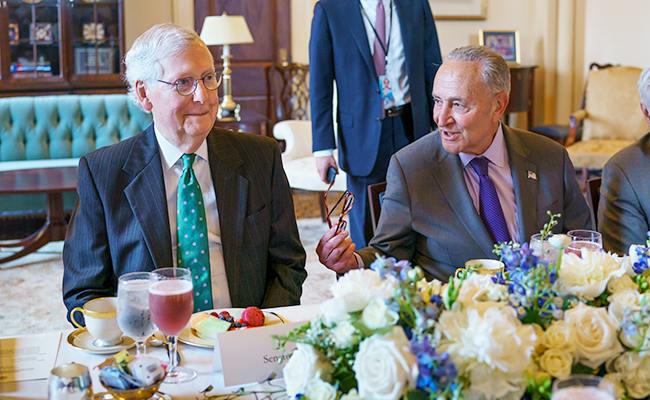
Senate Minority Leader Mitch McConnell (R-Ky.) and Senate Majority Leader Chuck Schumer (D-N.Y.) sit together during a luncheon with Iraqi Prime Minister Mustafa Al-Kadhimi on July 28. (J. Scott Applewhite/Associated Press)
The final deal could run into political trouble if it doesn’t pass muster as fully paid for when the Congressional Budget Office assesses the details. But Portman said the package will be “more than paid for.”
House Democrats have their own transportation bill, which includes much more spending to address rail transit, electric vehicles and other strategies to counter climate change.
At a private meeting of House Democrats on July 27, Rep. Peter DeFazio of Oregon, the chairman of the House Transportation and Infrastructure Committee, called the Senate’s bipartisan measure complete “crap,” according to two Democrats who attended the session and spoke on condition of anonymity to describe it.
House Speaker Nancy Pelosi did not commit to supporting the bipartisan package until she sees the details, but said July 28 she’s “rooting for it.”
Pelosi said, “I very much want it to pass.”
Senators in the bipartisan group have been huddling privately for weeks. The group includes 10 core negotiators, split evenly between Democrats and Republicans, but has swelled at times to 22.
Transit funding has remained a stubborn dispute, as Republican senators are wary of formalizing what has been a typical formula for the Highway Trust Fund allotting around 80% for highways and 20% for transit.
Americans, and the hardworking men & women who carry this economy on trucks, have waited long enough for Washington to act on our decaying #infrastructure.
We cheer this bipartisan breakthrough. https://t.co/wJWZfF1OYv — American Trucking (@TRUCKINGdotORG) July 28, 2021
Most Republican senators come from rural states where highways dominate and public transit is scarce, while Democrats view transit as a priority for cities and a key to easing congesting and fighting climate change. Democrats don’t want to see the formula dip below its typical threshold.
Sinema said transit and broadband were the remaining issues being finished up July 28.
Associated Press writers Alan Fram and Josh Boak in Washington and Tali Arbel in New York contributed to this report.
Want more news? Listen to today's daily briefing below or go here for more info:


